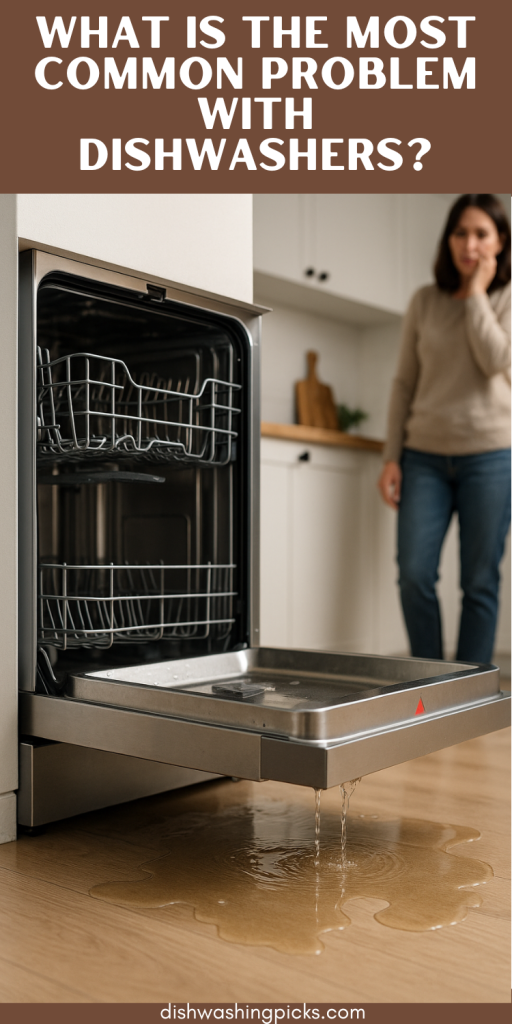
“Wait… is it supposed to sound like that?”
We’ve all been there. You’re loading up the dishwasher, dreaming of finally kicking your feet up, when—bam—it starts making a weird noise, or worse, doesn’t start at all. Sound familiar? Whether you’re a seasoned dishwasher pro or a newbie trying to escape the clutches of handwashing forever, you’re not alone in wondering: what’s the most common issue people run into with these machines?
Spoiler alert: It’s not the dishes themselves.
Let’s break it down in simple, no-nonsense terms. Stick with me—by the end, you’ll know what to look for, how to fix it (maybe), and when to throw in the dish towel and call in the pros.
The Culprit: Poor Drainage
If dishwashers had a “Top 10 Annoying Problems” playlist, drainage issues would be #1 on repeat. Yep, the most common problem with dishwashers is… they don’t drain properly.
And it’s not always obvious. You might open the door after a cycle and find murky water pooled at the bottom—or maybe your dishes just don’t smell all that fresh. Either way, it’s a sure sign something’s off.
But why does this happen?
Here are a few likely suspects:
- Clogged filter: Food gunk and soap residue build up over time. Gross, but fixable.
- Blocked or kinked drain hose: It’s like a traffic jam for dirty water.
- Faulty drain pump: Not the cheapest issue, but at least it’s diagnosable.
- Garbage disposal connection: If your dishwasher drains through the garbage disposal, a clogged disposal can back things up.
Try this: Imagine if your shower just… didn’t drain. You’d want to fix that, right? Same deal here—clearing out the filter once a month can go a long way.
Other Frequent Offenders (Because Of Course There’s More)
Alright, so drainage issues take the crown, but let’s not ignore the runners-up. These are like the annoying backup dancers that still manage to steal your attention:
1. Dishes Not Coming Out Clean
You didn’t sign up for a two-round wash, did you? This one’s usually because:
- The spray arms are clogged.
- You overloaded the dishwasher (hey, it happens).
- You used the wrong detergent (pods vs powder drama is real).
- Or your water temperature just isn’t hot enough.
Pro tip: Run hot water in your sink before starting the dishwasher—it helps prime it for a hotter wash.
2. Strange Noises That Weren’t There Yesterday
Is it humming? Grinding? Doing its best impression of a dying robot?
This might mean:
- Something’s stuck in the spray arm or drain.
- The pump motor is struggling.
- A utensil dropped below the bottom rack (looking at you, rogue spoon).
Sound familiar? Time to play dishwasher detective.
3. Leaks and Puddles
A little water on the floor might seem innocent… until it’s not.
Leaks often come from:
- A worn door seal (check the rubber lining).
- Too much or the wrong detergent (bubble city).
- A cracked hose.
Imagine stepping on a cold puddle first thing in the morning—motivated yet?
Prevent It Before It Starts: Simple Habits That Go a Long Way
No one wants to be the person who googles “why does my dishwasher smell like wet dog?” Trust me, maintenance is your friend.
- Clean the filter monthly.
- Run a vinegar rinse cycle every few weeks.
- Don’t overload it. Just… don’t.
- Check for blockages (spray arms, drain, filter) regularly.
- Use the right detergent and follow the manufacturer’s guidelines.
Try thinking of your dishwasher like your car. A little care and check-in now and then keeps it running longer—and saves you a whole lot of money and mess.
Wrapping It Up: Listen to Your Dishwasher
Dishwashers, like people, have their quirks. But when something’s off, it’s usually not that hard to fix. And now that you know drainage issues are the top dog (and you’ve got a few tools to deal with them), you’re already ahead of the game.
Next time your dishwasher starts acting up, don’t panic—just remember: filter, hose, spray arms, detergent. One of those is usually the troublemaker.
